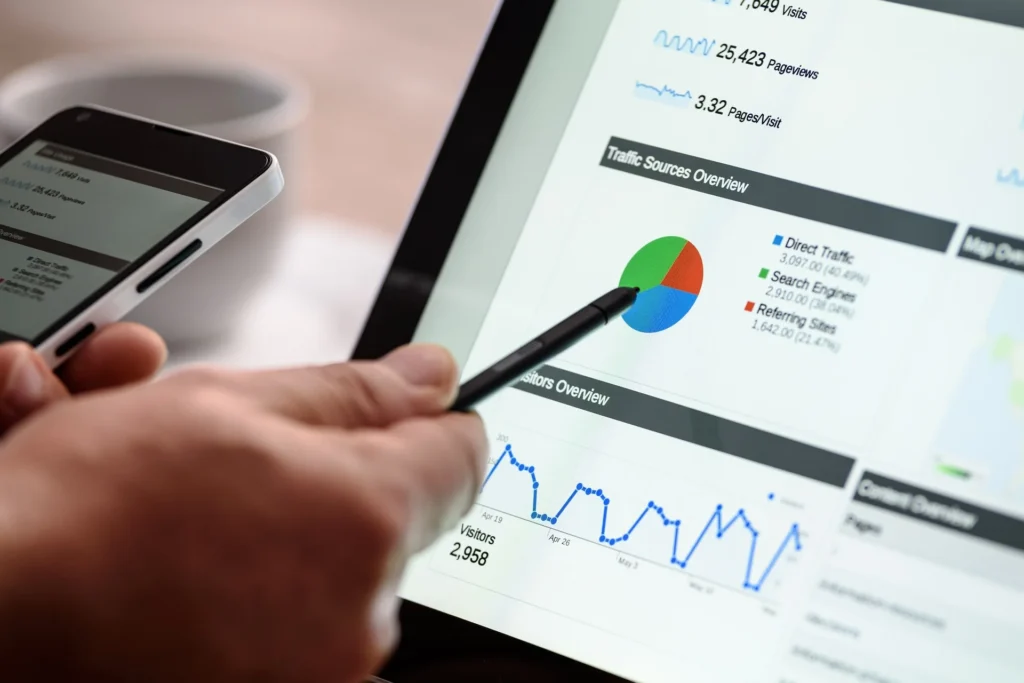In today’s competitive landscape, effectively measuring and analyzing marketing performance is crucial for B2B companies. B2B marketing KPIs help organizations not only gauge their current success but also identify areas for improvement. By systematically tracking these metrics, businesses can recognize trends, adapt their strategies in real time, and allocate resources more efficiently. This proactive approach enhances overall marketing effectiveness and fosters a culture of accountability and continuous improvement within teams.
Additionally, focusing on B2B marketing KPIs aligns marketing efforts with broader business objectives. These indicators provide valuable insights into customer behavior, campaign effectiveness, and market dynamics, enabling teams to make informed decisions that resonate with their target audience. By showcasing the direct correlation between specific KPIs and business outcomes, marketing teams can secure ongoing support from stakeholders. Ultimately, a solid understanding of B2B marketing KPIs empowers companies to navigate market complexities and drive meaningful results.
In this detailed guide, we will explore the realm of B2B marketing KPIs, addressing your key questions and providing you with the insights necessary to become a data-driven marketing expert.
What are B2B Marketing KPIs?
B2B marketing KPIs are quantifiable metrics that track the effectiveness of your marketing efforts, acting as a compass to guide you toward your digital marketing strategy. Unlike traditional metrics that merely measure activity, B2B marketing KPIs focus on results. For example, instead of counting how many times you cast your fishing line, you would measure the number of fish you catch—similarly, KPIs help you evaluate the leads, customers, and revenue generated by your marketing strategies.
These KPIs are essential for several reasons. First, they measure campaign effectiveness; without them, it’s challenging to understand how well your marketing campaigns are performing. Are you reaching the right audience? Are your messages resonating? KPIs provide the necessary data to answer these questions and optimize your campaigns for improved outcomes.
Additionally, B2B marketing KPIs empower you to drive data-driven decisions, ensuring that your marketing efforts align with your overall business goals. They also help you optimize your budget by identifying areas that yield the highest return on investment (ROI), allowing you to allocate resources more effectively. Moreover, these KPIs serve as a powerful tool to demonstrate marketing value to stakeholders, showcasing the impact of your campaigns on lead generation, sales, and revenue, which can secure ongoing support for your marketing initiatives.
Neglecting B2B marketing KPIs can have significant consequences. Without them, you risk making marketing decisions based on guesswork, leading to wasted resources, missed opportunities, and a stagnant bottom line. Now that you understand the importance of B2B marketing KPIs, let’s explore the specific KPIs you should be tracking!
The 7 P’s of B2B Marketing and KPIs
According to a leading digital marketing agency, the 7 P’s of B2B marketing provide a comprehensive framework for understanding the essential elements that contribute to marketing success. By aligning your strategies with these elements, you can create more effective and impactful marketing campaigns. Each of the 7 P’s can be measured using specific Key Performance Indicators (KPIs) to evaluate their effectiveness.
Starting with Product, the KPI of product adoption rate—defined as the percentage of customers actively using your product—helps assess the success of product launches and ongoing customer engagement. For Price, the average selling price serves as a KPI to evaluate the effectiveness of your pricing strategy and its impact on revenue generation. When examining Place, the effectiveness of distribution channels can be measured by the percentage of sales generated through various channels, such as direct sales or online platforms, which indicates customer reach and sales efficiency.
In terms of Promotion, the marketing ROI KPI measures the return on investment from your campaigns, offering insights into which strategies and channels are most effective. For People, customer satisfaction reflects how well your products and services meet customer needs, indicating the quality of customer experience and loyalty. The Process can be analyzed through the sales cycle length, which measures the average time taken to close deals, thereby highlighting areas for improvement in your sales process. Lastly, Physical Evidence can be assessed through brand awareness, which quantifies the percentage of your target audience familiar with your brand, thus evaluating the effectiveness of your branding efforts.
By tracking these KPIs, you can gain valuable insights into the effectiveness of your B2B marketing strategies, allowing for data-driven decisions that enhance your results.
The 4 C’s of B2B Marketing and KPIs
The 4 C’s of B2B marketing offer a customer-centric approach to developing marketing strategies by emphasizing the needs, desires, and preferences of customers according to a top content marketing agency. Focusing on these elements allows for the creation of more relevant and impactful marketing campaigns. Each of the 4 C’s can be effectively measured using specific Key Performance Indicators (KPIs) to assess their impact.
Starting with Customer, the KPI of customer lifetime value represents the total revenue generated by a customer over their lifetime. This metric is crucial for understanding the long-term value of your customer base and identifying high-value segments. For Company, market share serves as a KPI to measure your company’s percentage of the total market for your products or services, providing insights into your competitive position and growth potential.
When evaluating Competitors, competitive benchmarking allows you to compare your performance against key metrics of your rivals, helping to pinpoint areas for improvement and potential competitive advantages. Lastly, in the framework of Context, economic indicators such as GDP, interest rates, and unemployment provide relevant insights into the broader economic environment, enabling you to adjust your digital advertising strategies accordingly.
By tracking these KPIs, you can gain a deeper understanding of your customers and the competitive landscape, facilitating the development of more effective and targeted marketing campaigns.

Key B2B Marketing KPIs to Track
Key B2B marketing KPIs are essential for evaluating the effectiveness of your marketing efforts and identifying areas for improvement. After exploring frameworks like the 7 P’s and 4 C’s, it’s crucial to focus on specific KPIs across various categories according to a premier B2B marketing agency. Website traffic KPIs such as the total number of unique visitors, pageviews, and bounce rate provide insight into user engagement. Tracking metrics like average time spent on the site and the conversion rate—the percentage of visitors taking desired actions—further enhances your understanding of overall website performance.
In addition to website metrics, lead generation KPIs play a vital role in assessing marketing strategy effectiveness. Important metrics include the total number of leads generated, lead quality based on criteria like job title and company size, and the lead conversion rate (the percentage of leads that become customers). Monitoring the cost per lead helps evaluate the expense of acquiring new prospects. Furthermore, sales KPIs, including total sales revenue, average deal size, and customer lifetime value, provide critical insights into the financial health and efficiency of your sales process.
Social media marketing and engagement is another crucial area, with social media KPIs measuring metrics such as the number of followers, engagement rate (likes, comments, shares), and click-through rates for social media links. Additionally, content marketing KPIs—including content views, shares, and backlinks—are essential for evaluating the reach and impact of your content efforts. By consistently monitoring these KPIs, you can gain valuable insights into your B2B marketing effectiveness and pinpoint opportunities for improvement. In the next section, we will discuss strategies for effectively tracking and analyzing these KPIs.
Tracking and Analyzing B2B Marketing KPIs
Tracking and analyzing B2B marketing KPIs effectively requires the right tools and techniques. Analytics platforms like Google Analytics and Adobe Analytics provide valuable insights into website traffic, user behavior, and conversion rates. Customer Relationship Management (CRM) systems, such as Salesforce and HubSpot, help monitor leads, sales, and customer interactions. Additionally, marketing automation tools like Marketo and Pardot assist in tracking email blast marketing campaigns, social media engagement, and lead nurturing activities, while social media analytics platforms like Hootsuite and Buffer offer insights into follower growth and engagement rates. Data visualization tools, such as Tableau and Power BI, are essential for creating informative dashboards that present your data clearly.
Data cleaning and preparation is a critical step before analysis can begin, particularly for developing buyer personas. This involves data validation to ensure accuracy and consistency, data normalization to standardize formats, and data enrichment, where you add additional data points—such as demographic information or company size—to enhance your analysis. Ensuring that your data is clean and well-prepared is vital for obtaining meaningful insights that inform your buyer persona development.
Creating effective dashboards and visualizations helps you make sense of your data. When developing dashboards, focus on key metrics that are most important to your business and use various visualizations, including charts and graphs, to present data in an understandable way. Ensure that dashboards are easy to read and navigate, allowing for quick insights. Once your data is organized and visualized, you can engage in data-driven decision-making by setting clear goals for your marketing efforts and defining measurable KPIs to track progress. Analyze trends and patterns in your data to identify areas for improvement, experiment with different marketing strategies, and continuously monitor your KPIs, making adjustments to your campaigns as needed.
By following these steps, you can effectively track and analyze B2B marketing KPIs, driving your marketing strategy and achieving your business objectives.
Improving Marketing Strategies with KPIs
Improving marketing strategies with B2B marketing KPIs goes beyond mere performance measurement; it involves using these metrics to enhance your overall marketing approach. To effectively utilize KPIs for strategic improvement, begin with setting realistic KPI goals. Incorporating search engine optimization (SEO) metrics into your goals can significantly impact visibility and engagement. Establishing goals that are both achievable and aligned with your business objectives, industry benchmarks, and available resources is crucial for meaningful progress.
Next, analyzing KPI data helps identify trends and opportunities for improvement. For instance, if you notice a decline in website design traffic, investigating potential causes allows you to implement corrective measures to address the issue effectively. This proactive approach not only highlights problem areas but also reveals opportunities for growth.
Making data-driven marketing decisions is essential for optimizing your strategy. KPI data provides valuable insights that inform decisions; for example, if a specific content marketing campaign yields a high conversion rate, reallocating resources to support similar initiatives can maximize effectiveness.
Finally, continuous monitoring and adjustment of your KPIs ensures that your marketing strategies remain aligned with your business goals and deliver the desired outcomes. Regularly reviewing these metrics allows for timely adjustments based on performance, ensuring that your marketing efforts remain responsive and effective. By following these steps, you can leverage KPIs to drive meaningful improvements in your marketing strategies.
Final Thoughts
In conclusion, B2B marketing KPIs are indispensable tools for measuring and enhancing the effectiveness of your marketing efforts. By consistently tracking the right KPIs, including aspects of online reputation management, businesses can transform raw data into meaningful insights that drive informed decision-making. This proactive approach not only helps in identifying what strategies are working but also highlights areas for improvement, ultimately leading to better resource allocation and increased ROI. As the landscape of B2B marketing evolves, those who leverage these metrics will be better positioned to adapt, innovate, and thrive in a competitive environment.
At fishbat, a leading digital marketing agency in New York, we specialize in helping B2B companies harness the power of data-driven marketing. With over a decade of experience, our team understands the nuances of implementing and optimizing KPIs to create impactful marketing strategies. If you’re ready to elevate your marketing performance and achieve tangible results, reach out to us. We’re here to provide the expertise and support you need to turn your marketing insights into successful outcomes. Contact us today at 855-347-4228 or email hello@fishbat.com for a free consultation.


